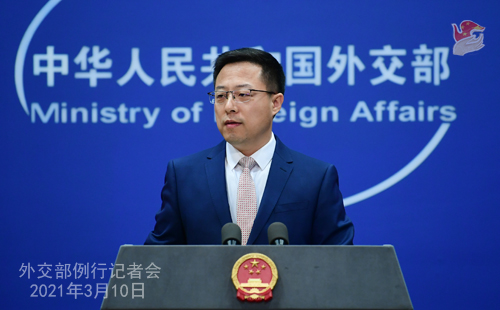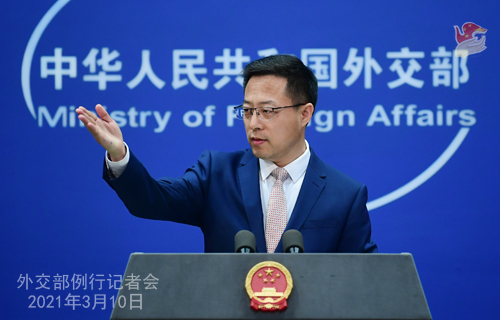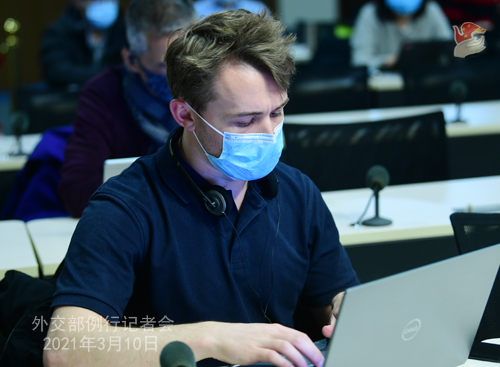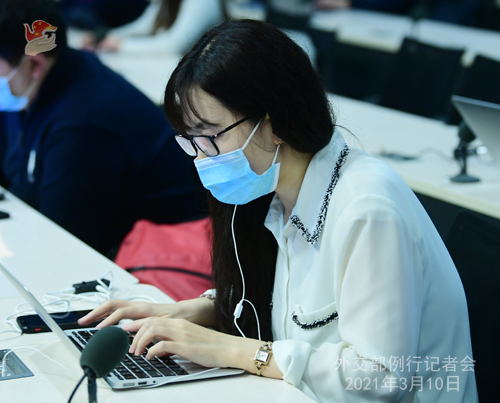| Foreign Ministry Spokesperson Zhao Lijian's Regular Press Conference on March 10, 2021 |
| 2021-03-10 21:21 |
|
CCTV: UN Secretary-General Antonio Guterres has congratulated China on its success in eliminating extreme poverty in rural areas. He said the notable accomplishment is a significant contribution to realizing a better and more prosperous world as envisioned by the UN 2030 Agenda for Sustainable Development. He also said that China's extraordinary achievements have provided hope and inspiration to the entire international community. What significance does China's success in poverty alleviation hold for the rest of the world? Zhao Lijian: We appreciate the positive remarks by Secretary-General Guterres. To eradicate poverty is the shared aspiration of mankind. As a major country with one-fifth of the world's population, China has made great historical achievements in eliminating absolute poverty, a problem besetting the Chinese nation for thousands of years. China has completed, 10 years in advance, the goal of poverty reduction set in the 2030 Agenda for Sustainable Development, which is a historic contribution to the international effort of poverty eradication and peaceful development. While committed to eliminating poverty at home, China has actively participated in international cooperation on poverty reduction. The Eradication of Extreme Poverty: China's Practices Report released last September shared cases in which China helped other developing countries break development bottlenecks as part of international development cooperation. In Asia, China and ASEAN countries have jointly launched a rural poverty reduction program. Technical assistance projects for poverty reduction demonstration in East Asia have been carried out in rural communities in Laos, Cambodia and Myanmar. In Africa, China has helped African countries build water conservancy infrastructure, set up demonstration zones for agricultural cooperation, and carried out cooperation projects on China-Africa fungus production technology. China has also carried out technical cooperation assistance projects in infrastructure, agriculture and medical care in the South Pacific region. We have also built agricultural technology demonstration centers in Latin America to help the local people shake off poverty. Poverty alleviation philosophies with Chinese characteristics, such as "targeted poverty reduction", are drawing more and more attention from the international community. The China-proposed Belt and Road Initiative is committed to promoting economic development in countries along the routes and helping them achieve the poverty reduction goals of the 2030 Agenda for regional economic and social development cooperation at a broader, higher and deeper level. The Belt and Road Initiative is expected to lift 7.6 million people out of absolute poverty and 32 million out of moderate poverty. China will continue to help developing countries enhance capacity building through multilateral and bilateral channels, and actively carry out international cooperation to press ahead with the process of poverty reduction worldwide. The Paper: According to reports by South China Morning Post and Reuters citing sources, the United States and China are discussing inviting Director Yang Jiechi and State Councilor and Foreign Minister Wang Yi to hold a high-level meeting with U.S. Secretary of State Antony Blinken and National Security Advisor Jake Sullivan in Alaska. Responding to a question on this, White House Press Secretary Jen Psaki said: "Obviously, the President spoke with President Xi back - February 10. And we will look forward to seeking opportunities for engagement, but we don't have any details finalized or confirmed at this point." I wonder if you have any comment on this? Zhao Lijian: During their successful telephone conversation on the eve of the Lunar New Year, President Xi Jinping and President Joe Biden agreed that the two sides will keep communication channels open. With regard to your specific question, I don't have any information to offer at the moment. Beijing Daily: Yesterday the Chinese Mission to ASEAN held through the Jakarta Channel a launching ceremony of commemorative activities marking the 30th anniversary of the establishment of dialogue relations between China and ASEAN. What activities will the two sides hold this year to mark the 30th anniversary? What does China expect of China-ASEAN relations going forward? Zhao Lijian: As we mark the 30th anniversary of the establishment of dialogue relationship between China and ASEAN, this year holds special significance for the development of our relations. China and ASEAN, through communication and consultation, have agreed to jointly hold dozens of events to mark the occasion, covering political, security, economic, trade, cultural and other sectors of cooperation. Leaders on both sides will exchange congratulatory messages. A commemorative meeting will be held, along with reception, seminar, exhibition presenting the outcomes of and forum on economic and trade cooperation. In addition, the two sides will release a commemorative album and a commemorative envelop, hold a short video contest and organize a youth camp. We look forward to working with ASEAN countries to ensure the success of these events and inject new impetus into the development of our relations. Standing at a new historical starting point, China is ready to work with ASEAN to build on the momentum of the 30th anniversary of dialogue relations to further consolidate political mutual trust, deepen practical cooperation in public health, economic, trade, social, cultural and non-traditional security sectors, promote post-pandemic economic recovery and long-term resilient development, forge a higher-level China-ASEAN strategic partnership and build a closer community with a shared future to better benefit regional countries and people.
AFP: I have two questions. First of all, U.S. President Biden will hold Quad alliance talks with Australia, India, and Japan on Friday. What's China response to this? Secondly, the top U.S. Admiral Philip Davidson said that he fears China could invade Taiwan in the next six years. And China's Ministry of Defense in January said that Taiwan formally declaring independence means war. What's your response to Admiral Davidson's comments? Zhao Lijian: Regarding your first question, regional cooperation arrangements should all conform to the trend of the times which is peaceful development and win-win cooperation. We hope that the relevant countries will act in line with the common interests of regional countries, uphold the principle of openness, inclusiveness and win-win outcomes, and do more things that are conducive to regional peace, stability and development, not the other way around. On your second question, China has stated its position on the Taiwan question many times. By exploiting the Taiwan question to exaggerate China's military threat, some people in the United States are actually looking for excuses to justify the increase of the U.S. military expenditure, expansion of its military power, and interfere in regional affairs. The United States should abandon the Cold War zero-sum mentality, view China's development and national defense development objectively and rationally, and do more things that are conducive to mutual trust between China and the United States and regional peace and stability. Global Times: The American Chamber of Commerce in China (AmCham China) announced the findings on March 9 in its 2021 Business Climate Survey. The report said that its members are still largely committed to the China market, considering China as a priority investment destination. In the survey, 75% of companies said they are optimistic about the prospects of the Chinese market, and 81% of companies said they expected their businesses to grow in China. What is your comment? Zhao Lijian: This report is the latest testament to the mutually beneficial and win-win nature of China-U.S. economic and trade ties. Actually, the report also points out that many foreign companies in China have given positive reviews on China's investment environment, with two thirds of companies indicating their willingness to increase investment in China, which reflects the growing confidence that foreign companies have towards the Chinese market. China will continue to deepen reform, open wider and work towards a market-based and law-governed business environment that is up to international standards so that the U.S. and other foreign business community will feel more comfortable operating and investing in China, and the Chinese and foreign companies will find stronger support in their mutually beneficial cooperation. We hope that the U.S. side will also uphold an open and inclusive attitude to seek win-win results, lift its unjustified restrictions, stop clamping-down on Chinese companies. The US side should work with China to focus on cooperation, manage differences, bring China-US relations back on track, and create favorable conditions for the sound and steady development of China-U.S. economic and trade cooperation. Reuters: China summoned the UK ambassador on Tuesday to lodge stern representations over an article she wrote on the role of the media. What was the specific point the ambassador made in this article which the foreign ministry disagreed with? Why is it inappropriate for foreign diplomats to give their views on Chinese social media, given that Chinese diplomats often do so on foreign platforms and publications? Zhao Lijian: The Ministry of Foreign Affairs of China has already summoned Ambassador Caroline Wilson to state our solemn position on the relevant issue. You can also check out the reactions of Chinese netizens to her article. Who is right and who is wrong is clear, and the public also knows the answer clearly. Ambassador Wilson's article, with a confused logic, avoids all the facts, including the British media's disinformation and false reporting on China, and deliberately confuses news slandering with news supervision. The article makes no mention of the Chinese media being suppressed in foreign countries, but praises the so-called Western experience in an arrogant tone, and makes irresponsible remarks about China's system and media. It is in nature an interference in China's internal affairs, reflecting her consistent double standards and deep-rooted ideological prejudices. The Chinese Ambassador to the UK Liu Xiaoming also published some articles during his stint in the UK, all of which are in objective and positive tones, meant to introduce China and China-UK relations. Some of his articles have been written to dispel false words and rumors concerning China disseminated by some British media. He has never written any article to provoke disputes, or attack the British system. In fact, when Ambassador Liu Xiaoming published articles in the British media, it was not as free and easy as Ambassador Wilson said, as his articles have been repeatedly rejected in recent years. I also want to emphasize once again that the responsibility of diplomatic institutions is to promote friendly bilateral relations. Diplomats have the obligation not to interfere in the internal affairs of their host countries. This is a bottom line that cannot be crossed. Reuters: China has launched digital COVID-19 vaccination certificate for citizens planning to cross borders. Do you have any details on which countries China is in talks with to get these certificates recognized? Zhao Lijian: China has introduced its electronic health certificate for international travelers to other countries and relevant international organizations. To date, many countries and some international organizations have expressed readiness to seek mutual recognition in this regard with China. We hope to launch such mutual-recognition mechanisms with other sides on the basis of accommodating each other's concerns and through friendly consultation so as to facilitate cross-border travel and foster sound, safe and orderly flow of personnel.
China Daily: U.S. State Department spokesman Ned Price said the United States has not seen any developments that would change its determination that China committed genocide and crimes against humanity in its treatment of Uighur Muslims in Xinjiang. Can you comment on this? Zhao Lijian: The claim of "genocide" in China's Xinjiang is ludicrous and baseless. It's an outright ill-intentioned rumor and lie. The United States should not make such an accusation with no proof at all. China firmly opposes groundless attacks and smears. The United States endorsement of disinformation, lies and rumors only further damages its credibility and image. As we said repeatedly, the Uighur population in Xinjiang grew from 5.55 million to over 12 million over the past four decades or so. Is the doubling of population called "genocide"? By contrast, those who learned the history of the United States know that native Indians were expelled and killed during the Westward Expansion, and their population nosedived by 95% from 5 million in 1492 to 250,000 at the beginning of the 20th century. In another word, the population dwindled to one twentieth. It's not China, but someone else, that is more suitable for the label of "genocide". The first thing the United States should do is to pay attention to and improve the domestic human rights situation, rather than pointing the finger at others on the basis of lies and rumors. China is willing to have dialogue and exchange on human rights with other countries on the basis of mutual respect and equal-footed treatment, but we resolutely oppose fabrications, slanders and interference in others' internal affairs under the pretext of human rights. Kyodo News Agency: A leaders' meeting of the Quad group of countries on Friday plans to announce agreements to support an increase in coronavirus vaccines aid to developing countries. Some call this move an attempt to counter China's widening "vaccine diplomacy". Do you have any comment? Zhao Lijian: Now that you have asked this question, I would like to brief you on China's supply of vaccines to other countries. China is a committed front-runner in promoting international vaccine cooperation. We have carried out vaccine R&D and production cooperation with a dozen or so countries, attracting more than 100,000 volunteers of over 100 nationalities. Altogether, 17 Chinese vaccines have entered clinical trials. More than 60 countries have authorized the use of Chinese vaccines. The safety and effectiveness of Chinese vaccines are earning recognition across the world. China is prepared to discuss with other countries the feasibility and protocols for mutual recognition of vaccination. China is a steadfast advocate for equitable vaccine distribution. We have joined COVAX, under which China has undertaken to provide an initial 10 million doses for emergency use in developing countries. So far, China has donated or is donating COVID vaccines to 69 developing countries in urgent need, and is exporting vaccines to 43 countries. Responding to a UN appeal, we have donated vaccines to peacekeepers from various countries. We are also ready to work with the International Olympic Committee to provide vaccines to Olympians. It is our hope that Chinese vaccines will inject more confidence and hope into the global fight against the virus. Vaccines are a powerful weapon against the virus and bring hope for saving lives. They should serve the entire world and benefit all humanity. China is a firm believer in making COVID vaccines a public good. China was among the first to pledge that its vaccines, when available, will be made a global public good, and China has worked in real earnest to improve vaccine accessibility and affordability in developing countries. That's what we've been saying and what we've been doing. A number of vaccines are now available around the world. It is up to each country to decide which one to choose. Whether it is a Chinese vaccine or not, it is a good vaccine so long as it is safe and effective. China opposes "vaccine nationalism". We reject any "vaccine divide" or any attempt to politicize vaccine cooperation. PTI: With regard to what you said about mutual recognition of vaccines by different countries, will China wait for the vaccines of a particular nation or Chinese vaccines themselves to be recognized by the WHO? Because WHO so far has recognized only three vaccines, that is Pfizer and AstraZeneca. Do you think it is necessary for WHO's recognition for China to recognize other's vaccines or it is a bilateral arrangement that China is looking at? And also China has promised to give 10 million vaccines to COVAX, but is China giving to COVAX without recognition or approval of your vaccines by the WHO? Zhao Lijian: Thanks for your question. To my knowledge, Chinese vaccine companies have submitted applications to the WHO and the latter in response has sent teams to China. The procedures for recognition are ongoing. The safety and efficacy of Chinese vaccines has been widely recognized by various countries. I believe China and the WHO are having good communication in vaccine recognition. *** After the conclusion of the fourth session of the 13th National People's Congress (NPC), Premier Li Keqiang will hold a press briefing and take questions from the press at the Great Hall of the People on the afternoon of March 11 (Thursday). The regular press conference of the Ministry of Foreign Affairs will be adjourned on March 11 and resumed on March 12 (Friday).
|




